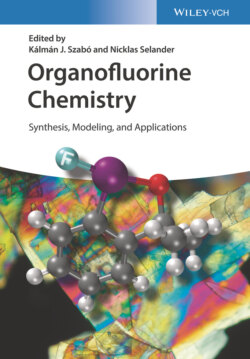Читать книгу Organofluorine Chemistry - Группа авторов - Страница 10
1.2.1 Fluorine‐Enabled Stability of “CuCF3” in Water, and the Unusual Water‐Promoted Trifluoromethylation
ОглавлениеOrganocopper reagents are widely used in organic synthesis [13]; however, these reagents are typically water sensitive. In 2012, we disclosed a water‐promoted trifluoromethylation of α‐diazo esters to access α‐trifluoromethyl esters, representing the first example of fluoroalkylation of a non‐fluorinated carbene precursor (Scheme 1.1) [14]. We found that “CuCF3” (prepared from CuI/CsF/TMSCF3) in n‐methyl‐2‐pyrrolidone (NMP) is stable even in the presence of 66 equiv of water at room temperature within five hours and only about 5% of “CuCF3” decomposed. Taking advantage of the unusual stability of “CuCF3” in water (fluorine effect), we could therefore use water (CuI is also applicable) as the iodide scavenger to enhance the activity of “CuCF3” prepared from CuI/CsF/TMSCF3 significantly by changing “CuCF3” in the form of [Cu(CF3)I]− to “ligandless” [Cu(CF3)], which is more reactive toward α‐diazo esters. From an organometallic chemistry point of view, water promotes the ligand exchange in “CuCF3” by eliminating iodide, making the ligation of α‐diazo esters to “CuCF3” more favorable. The stability of “CuCF3” toward water and the instability of alkylcopper intermediate 1 toward water ensure the success of this reaction.
Scheme 1.1 Water‐promoted trifluoromethylation.
